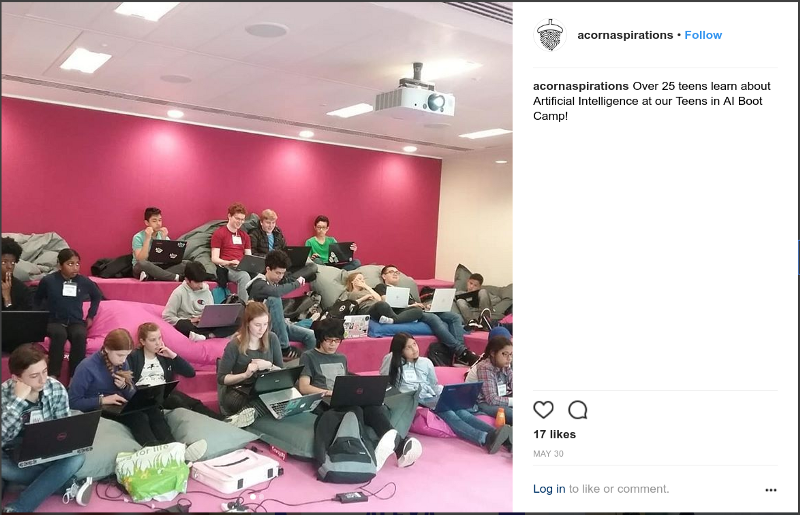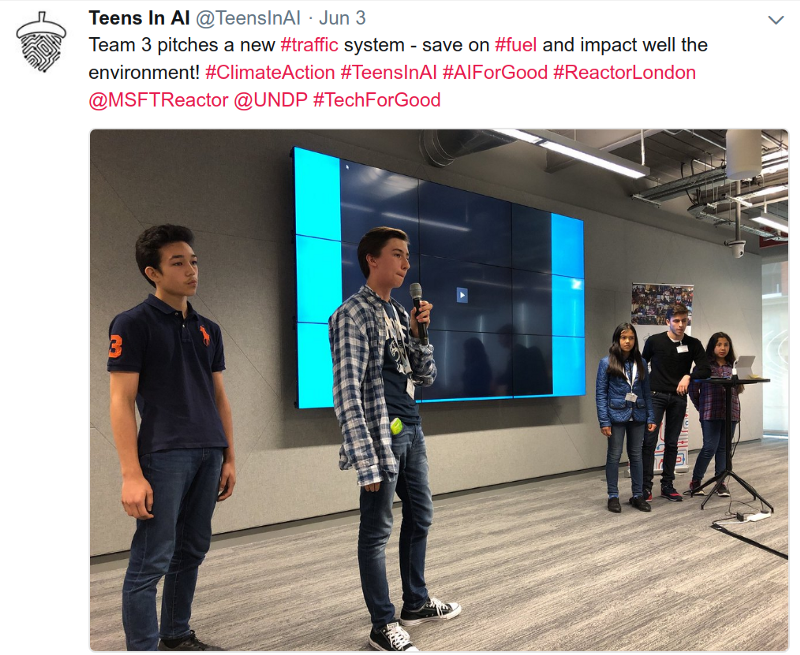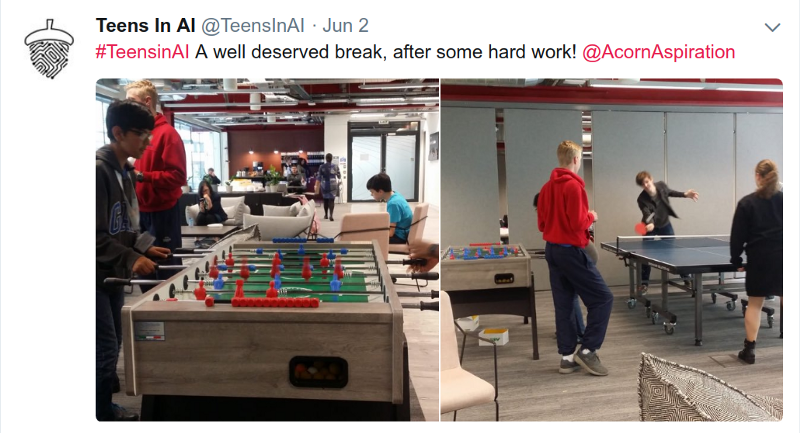Digital Skills and Tech for Good
June 2019
My sixteen-year-old son has been active for about a year, with a local education startup, Acorn Aspirations, that aims to empower teenagers with the skills and attitude to emerge as entrepreneurs and tech leaders. And, this seems a good time to summarise the changes I saw in him.
An ambitious programme is the Teens In AI initiative for 2018 that aims to expose the emerging A.I. startup world to teenagers, with a series of boot camps and accelerators timed for the school holidays. This follows on from previous Acorn Aspiration programmes that would scope any startup idea, relying on the tried and trusted recipe of LEAN Design Thinking, Scrum, creating a Pitch Deck and presenting it. This goes down pretty well amongst the cohort, despite almost all of them looking like fishes out of water at first. Can you imagine going from high school to a tech startup overnight, and being expected to contribute? It’s going to be a bit of a shock but hopefully, a very beneficial one. Parents get to watch the happenings through a stream of tweets and video on their various feeds https://twitter.com/TeensInAI.

After fevering for a couple of weeks amid a deluge of inspiring talks, presentations and sometimes group coding for Alexa, Deep Learning (including a self-playing Atari game demo, coded, explained in-front of them, which they could freely take home and keep), they would begin building their products.

My son is recently homeschooled, so he is free to choose what he works on. Because he enjoys these events, he tends to dedicate all his energy to them when they’re on. My limited interaction with him when an event is on usually happens in the kitchen when one of us is cooking the evening meal. He likes to keep me at arm’s length, which is fine with me, (helicopter parenting is so 90’s anyway), and I use my massive advantage in people skills to probe him about progress and his thoughts without him noticing mostly, (I think I’m going to call this satellite parenting). This is what strikes me the most, monitoring him over the last year:
He has learnt to exploit his very logical mindset to good effect during LEAN Design Thinking. Tearing holes in other people’s ideas is something he understands might rile some people but, he has learnt to explain why it’s such a good idea, and to encourage everyone to do the same. Before he would not do this, he would be much more likely to disagree once, then abandon the whole process. Now, he fights for correctness, and sees it as a virtue, this in itself is a correction of its own, of the school system which relies on indoctrination rather too much.
He has become a technology translator. He’s had opportunities to work in teams before, through sports matches and school projects but, not at this level. I have noticed a level of sophistication that would not look out of place in any high-performing organisation, which also seems evident in some of the other teenagers that have attended multiple events. Learning the different personality types, from super creative, to super focused and everything between so that you can adapt your approach is incredibly valuable to learn early. Many companies I’ve noticed, struggle to handle talent effectively and only realise when workers leave. Having intuition with how techies, business people and product owners think enables you to interject in meetings or discussions quickly, to effectively eliminate dysfunction and increase performance. This is the key skill to have today.
He has become holistic. This goes together with his emerging sense of ownership and thinking of his work as assets. He is now naturally embedding quality in his work so that it is understandable by others and may be perceived as a thing of value. Again, this is the sort of attitude I would expect in someone in their third job, someone in their late twenties, I find this very pleasing.
The audacity of it all. He’s sixteen, with a year and a half of experience, he shouldn’t be thinking that he can challenge PhD’s and Developers with decades of knowledge but, I can detect a glint in his eye that suggests he wants to. He’s always been competitive but, I suspect a little of this has rubbed off from the amazing Elena Sinel at Acorn Aspirations, who pioneered Teens in AI, an audacious quest in its own right.
A complete disconnect with the typical education pipeline. He just doesn’t ever mention it. I’m fine with that, however, our country isn’t. Companies here simply do not want an under eighteen in the building. UK apprenticeships are bound by regulation and generally suit old-fashioned roles and of no use. This leaves only freelancing as an option for him, a difficult proposition for the UK under eighteen, and in effect forces them to go under the radar, which is the last thing we should be encouraging vulnerable teenagers to do.

I guess I have a fairly unique perspective of parenting someone who once followed a traditional high-quality education in the UK as an A student, then at fifteen, suddenly following a radical agile unschooling one and being successful there too. The important realisation is the size of the scope between the two. High school here is a micro-managed, watered down approximation of 1950’s British grammar and US high schools. His unschooling experience is an approximation of the current tech world of Artificial Intelligence product design, a competitive place filled with PhD and MSc graduates. I didn’t plan it this way, it just happened and it happened to suit him particularly well.
This teen accelerator has been an enormous enabling factor for him, and I thoroughly recommend it for children looking to work like modern real-world companies do, in a friendly, fast-paced and well-connected space. I hope the concept takes off, we need more companies doing this!
Looking back, his relative velocity is against himself; the self that he abandoned in December 2016, when he said: “I don’t want to go to school anymore”. Dedicating time to a good teen accelerator gives you an advantage over your peers of being more employable, having cultural visibility, being more connected to the industry and receiving personal development advice from successful business people.
And apparently, it’s good fun.
Originally posted here
Acorn Aspirations were a 2019 Impact Awards Finalist